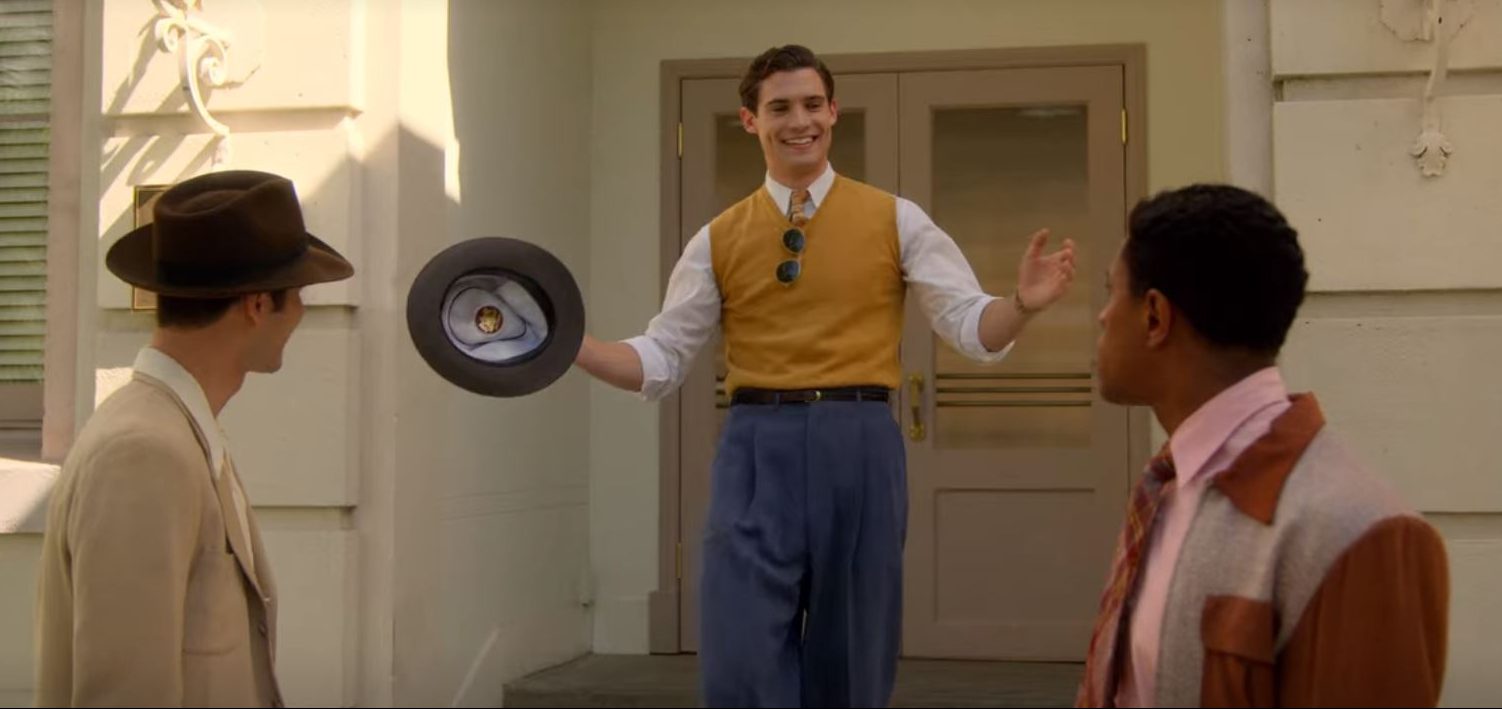| Worth seeing: | as an escapist glimpse behind the scenes of an imagined 1940s Hollywood |

| Featuring: | Darren Criss, David Corenswet, Dylan McDermott, Holland Taylor, Jake Picking, Jeremy Pope, Joe Mantello, Laura Harrier, Patti LuPone, Brian Chenoweth, Jim Parsons, Katie McGuinness, Maude Apatow, Michelle Krusiec, Mira Sorvino, Queen Latifah, Rob Reiner, Samara Weaving |
| Key crew: | Daniel Minahan, Janet Mock, Jessica Yu, Michael Uppendahl, Ryan Murphy, Eryn Krueger, Ian Brennan, Lou Eyrich, Todd Nenninger, Hernando Bansuelo, Reilly Smith |
| Channel: | Netflix |
| Length: | 50 minutes |
| Episodes: | 7 |
| Broadcast date: | 1st May 2020 |
| Country: | US |
WHAT’S IT ABOUT?
In the post-war years, Jack Castello (David Corenswet) is having trouble getting work as an extra at Hollywood’s Ace Studios.
Desperate for money, he accepts work at a car garage, run by Ernie West (Dylan McDermott), as a front for an escort business.
Married, with twins on the way, he feels uncomfortable about the work, but with one of his regular clients being Avis Amberg (Patti LuPone), the wife of the studio owner (Rob Reiner), he sees a way of getting into the movie business through the back door.
Jack is even more uncomfortable when Ernie asks him to serve men too, so he heads to a gay cinema to find someone who might like to take those jobs; it turns out that Archie Coleman (Jeremy Pope) is a screenwriter, who already has a script in development at Ace Studios.
Before long, Jack finds himself in line for a role in Archie’s film, but when the director Raymond Ainsley (Darren Criss) wants to tweak the script to cast his black girlfriend Camille Washington (Laura Harrier) in the lead, the whole project is thrown into doubt.
Is 1940s Hollywood – and the world beyond – ready for a film about a black woman.
WHAT’S IT LIKE?
Over seven episodes, Ryan Murphy – the creator of shows including Glee and Pose – delivers a glimpse into the workings of the Golden Age of Hollywood but with a twist – a liberal twist.
This series imposes 21st Century sensibilities on 1940s Hollywood, acknowledging that a large proportion of those working in the industry are gay and that black people are worthy of more than just playing servants – and shouting it from the rooftops.
With a central cast little known outside Murphy’s own productions, there’s a freshness to the show, with every one of the lead characters proving to be likeable and easy to root for.
And with so many of the supporting players being big names in their own right, even the sleasy underbelly of show-biz turns out to be unexpectedly cuddly; Jim Parsons, Dylan McDermott, Rob Reiner, Patti LuPone and Oscar winner Mira Sorvino are among the industry veterans who bring Ryan Murphy’s progressive fantasy to life.
It’s an enjoyable show – which works well enough as a drama, with suitable tension, as doubts are raised about whether the project at its heart will go ahead. But the central conceit never quite feels convincing; you can imagine a world where a studio might have wanted to give a break to a talented black actress, but surely it would find her an appropriate vehicle, rather than re-writing a real-life story about a white woman – there’s more than one script floating around town at any one time. And the final episode flips a little too far from liberal fantasy to worthy fairytale.
It’s also possible that some viewers might be left with a slightly sour after-taste, with the presentation of Rob Reiner’s studio boss and Jim Parsons’s sleazy agent as well-meaning, cuddly and ripe for rehabilitation in a way that many wouldn’t extend to real-life bullies and sex abusers, such as Harvey Weinstein.
In addition to a couple of initially unsavoury characters, in Murphy’s version of 1940s Hollywood, the biggest antagonist seems to be the conservative public – audiences who protest outside the studio at the thought of a black lead in a film. It’s a brave producer who – in a sense – casts potential viewers (or at least those who don’t share his outlook) as the villains.
Hollywood presents a slightly uncomfortable contradiction – a Hollywood that’s more welcoming of diversity but more forgiving of bullies.
